Tribute, Part 2
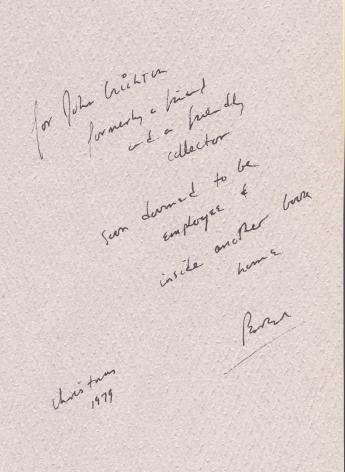
Part 2
“made my future in this profession possible”
By John Crichton
In July of 1975, fresh out of college with a degree in journalism in hand, I moved to Berkeley, California, and found myself living on Francisco Street, one block from Serendipity Books, a bookstore I had previously known only through its catalogues. I went there almost immediately, but the first few visits there was no Peter Howard, a name and face I did not at that point even know. On those first visits the store was always quiet; it felt nearly deserted. But one day I returned and the quiet was gone; there was something different about the store; there was an almost palpable kinetic energy in the air.
Peter was there.
This mild-mannered, insecure kid from the South was nonplussed the first few times being around Peter. He challenged and engaged and tested your mettle. He demonstrated interest and extended trust and generosity. He unabashedly shared his knowledge and expressed his opinions. I slowly became a steady customer, as I slowly got to know Peter and his employees, Tom Goldwasser, Nancy Kosenka, John McVey, Nick Nicholas and, a little later, Burton Weiss. I was one of the many that regularly visited Serendipity, was extended credit without questions, and rarely left without books.
Later that summer Peter invited me to share in one of his passions, a Giants game at Candlestick Park. Peter drove several of us to the game in the Serendipity Volkswagen van and on the way exited in downtown San Francisco. He said we were stopping to pick up someone named Franklin, and he made a point of noting that this Franklin and I would like each other, that we had things in common. I didn’t know who Peter was talking about, but soon we stopped near Union Square and into the van climbed Franklin Gilliam, the fabled owner of the Brick Row Book Shop, a shop I had visited numerous times, but I had not met its owner because he had always either been at lunch, out of town, or simply not there. Peter was keenly perceptive as usual: Franklin and I did indeed have a great deal in common and from that point on became close friends.
As my career in journalism fizzled out, my interest in antiquarian books and the book business grew, and by 1979 I was actively seeking a job somewhere, anywhere, in any position, in the Bay Area book trade. I told every friendly bookseller of my desire, but no job offer was forthcoming. Then one evening in early December the phone rang at home. It was Peter. The conversation went something very close to this:
P: John, it’s Peter Howard. Are you still looking for a job in the book trade?
J: Yes.
P: Well, I need a bookkeeper.
J: But, but I don’t know anything about bookkeeping. I cannot even remember the last time I reconciled my own checking account.
P: [momentary silence] You said you wanted a job in the book trade. Are you willing to learn?
J: Uhhhh, well, yes, of course I am.
P: Then when do you begin?
I began less than a month later, the first of January, 1980. Just before that Jean Peters’ work Collectible Books: Some New Paths, a group of essays on book collecting, had been published. Peter was the author of chapter nine, entitled “American Fiction since 1960.” Serendipity had copies for sale, of course, and Peter inscribed one to me as follows: “For John Crichton / formerly a friend / and a friendly / collector / Soon doomed to be / employee & / inside another book / home / Peter / Christmas 1979.”
I was not sure what “soon doomed to be employee” meant, but it didn’t take long to find out. I was the bookkeeper at Serendipity for three full years, and in that time I learned a tremendous amount about the mechanisms, machinations and personalities of the antiquarian book trade. Peter was generous with his knowledge about customers and books. He was generous with his money: he paid well. He was generous with the terms he extended to customers and consigners. He constantly gave back to his business. He worked hard and long hours. He taught by example. Being an employee there meant accepting that Serendipity was run by Peter’s rhyme and Peter’s reason, and interpreting that on a daily basis could be a challenge, but it was also rewarding.
My tenure at Serendipity was interrupted by the unexpected invitation of Franklin Gilliam, whom Peter had introduced me to seven years before, to purchase the Brick Row Book Shop. Peter's response to my announcement was mildly amused surprise, with supportive words of advice and encouragement, and only a bit of gentle challenging.
What I got from Serendipity Books propelled me into the antiquarian book trade. It was an experience that made my future in this profession possible - a once doomed employee perhaps, but one who had indeed been welcomed inside another book home, and with many thanks to Peter, has never left it.
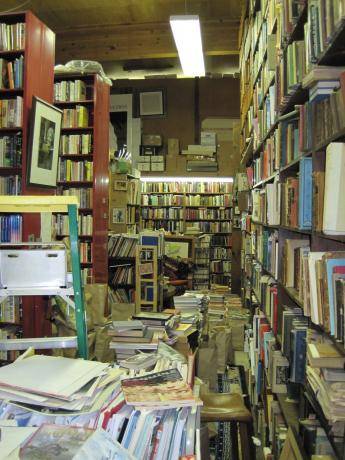
“the ayatollah...”
By Mary Cooper Gilliam
Peter Howard stands out as an original even in a trade known for being one of the last holdouts of the rugged individual. I met Peter in the 1970s with my late husband Franklin who coined the often used nickname, the Ayatollah. In Northern California, where Warren Howell was known as the Emperor, Peter was the Ayatollah. Since then I have had many encounters with Peter some of which have made me furious to the point of wanting to strangle him and others that have totally charmed me. It is hard to imagine book fairs without him. Something will have gone out of our world when he leaves it. Something besides his intensity and passion.
My favorite is when he taught at Rare Book School in Charlottesville in the summer of 1994. Peter, who many of his students and the Special Collections staff of the University of Virginia Library had never met but only knew by reputation as a legendary dealer of modern firsts, appeared in his usual attire of shorts, Greek sailor's hat with skinned knees and a fanny pack. I should also hasten to add a rather unkempt beard. This truly brilliant bookman looked to those who encountered him that summer like “an idiot savant on the loose." Vintage Peter.
“no ordinary mortal”
By Ed Glaser
I first became aware of Peter Howard and his particular universe just before setup for a New York Book Fair in the early 1970s. I think it was in a top floor ballroom of the Hotel Roosevelt and a large group had assembled waiting for access to the room. One of the patrician ladies who was then prominent in the New York book trade called my attention to a somewhat scruffy group sitting on the floor possibly enhancing their waiting time with a recreational smoke.
“Those hippies from California,” she sniffed.
I soon found out that “those hippies” were a contingent from Serendipity Books.
Peter Howard is by any standard one of the giants of the trade in our time. He exemplifies one of the principal reasons I have always found the trade so appealing: you can get to do it your way. And Peter certainly does do it his way. Any ordinary mortal would be dwarfed sitting among the tall shelves and piles of books at Serendipity. But Peter is no ordinary mortal and the solitary figure sitting at the desk in that vast sea of books was, it was immediately obvious to anyone entering his premises, emperor of his realm. He very possibly would not bother to look up or even acknowledge your existence and his style surely alienated many people. It is often taken for rudeness, but knowing what I do about Peter and his many, many kindnesses to so many, I have come to believe it is a kind of shyness. (Peter might very well vehemently dispute this as I think he enjoyed his gruff, often forbidding persona, a role that shields him from interacting with fools, whom he doesn’t suffer gracefully.)
There is no dispute that Peter is a whiz at the core of this business, buying and selling books. He has bought some of the major collections of our time, either alone or in partnership with a number of other dealers he worked with. In addition, he handles many books on consignment from fellow dealers to their mutual profit. It is hard to imagine any serious collector or dealer or librarian who has not, at one time or another, bought books from Peter. Peter has the knack for pricing books at just that critical level where the potential buyer is at least tempted. But Peter is a great deal more than a successful merchant, and his bibliographic advice has been invaluable to many of the most important libraries in the country.
The best of the major booksellers usually spawn additional generations of booksellers. Serendipity has been no exception. Among those who got their start under Peter’s eye are John Crichton of Brick Row Books, Tommy Goldwasser, and Burton Weiss. I am sure there are others who I will be embarrassed not to have recalled, but I beg their indulgence. The combination of writing under deadline and a balky memory are my excuses. And how can one scan his recollections of Peter Howard without mentioning his faithful, long-time employee, Nancy Kosenka.
In addition to those who worked for him, a solar system of satellites revolved around Peter: scouts, beginning booksellers and the like and I have heard many stories concerning Peter’s financial and moral support to them. Rude, aloof, yea, even boorish to some, he has been, in the best sense of the phrase, a soft touch to those truly in need.
Peter’s contributions to the trade include serving on the Board of Governors of the ABAA and his election to president from 1992 to 1994. He has also been a faculty member at the Antiquarian Book Trade Seminar in Colorado.
When I think of Peter the visual that comes to mind is Peter sitting in his booth at a book fair invariably wearing the cap of his beloved San Francisco Giants for whom he has been a season ticket-holder for many years.
One of the glories of the antiquarian book trade is that it has room in its tent for many practitioners who don’t quite fit any standard mold. We not only tolerate eccentrics, we embrace them, united in our common love of books. Peter Howard has made an indelible mark on the antiquarian book world of our time.
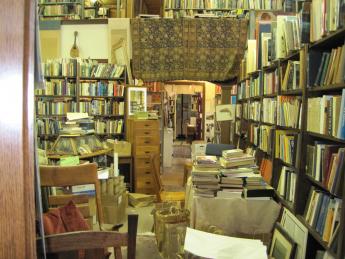
For Peter and Alison, travellers
By Eric Korn
Peter and Alison, travelers also
And more, returning refurbished
With new tongues and new speech
(Diligently furnished
with new words),
Clattering, chattering
Like an old keyboard.
A new conscience and new imperatives
New sharpened...
When a Howard picks you
you stay picked,
Sometimes uncertain
but happily so,
What may be too far
or at least the wrong direction;
Peter in Manhattan: does anyone know
The name of this restaurant
Or how to spot the Panchen Lama...?
A spotlight resounds: Alison singing
like six dozen angels; her words
turn to water; and everything
sings. swings. swings. sings.
swings.
swings.
dear peter:
By John Martin
How could anyone fully grasp and then describe that wonderful complexity known as Peter B. Howard?
For nearly fifty years now I have admired (and appreciated) watching your progress through this difficult and uncompromising life as a master bookseller. Of course, it hasn’t always been wine and roses between us. At first, when we were very young men (as compared to now) there were the few inevitable misunderstandings that once or twice lead to unkind (if unspoken) thoughts. Because after all is said and done, book collecting and book selling are competitive by their very nature.
But those trivial misunderstandings were long ago and count for nothing now.
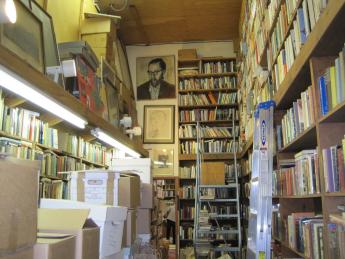
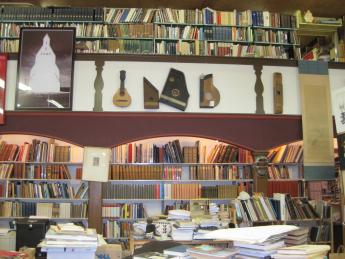
As a book collector, I cheerfully confess I learned most of what I know from three outstanding teachers: Henry W. Wenning, Margie Cohn, and Peter B. Howard. All three of these unique booksellers not only taught me how to conduct myself properly as a collector, but also by example taught me, in many ways, how to conduct myself as an individual in the business world. What more could anyone ask of one’s peers and associates?
Peter, in so many ways and for such a long time you set the tone and the standard for your book selling peers. Your taste, energy, ethics, generosity and determination to succeed were and are an inspiration and a marvel. Finally in this too short life, all good things must come to an end. I am now a retired publisher (if still an active collector!) and you have now, because of illness, withdrawn from active book selling. Looking back, please let me assure you that I recognize and admire all the good you have accomplished, over so many years, for so many.
In friendship and with every best personal wish.
Booktryst thanks Dan Adams, John Baxter, Taylor Bowie, John Crichton, Mary Gilliam, Ed Glaser, Eric Korn, John Martin, David Mason, James Pepper, Ken Sanders, Charles Seluzicki, Ralph Sipper, Martin Stone, Michael R. Thompson, Jeff Towns, and Vic Zoschak for their contributions.
A special thank you to James Pepper and John Crichton for their assistance with getting this project off the ground. Very special thanks to James Pepper and Ralph Sipper for their ongoing encouragement and support.
Part 2 of A Wake For The Still Alive was posted on Booktryst, in August 2010, and is presented by permission of Stephen J. Gertz.
John Crichton is the proprietor of The Brick Row Book Shop. Mary Cooper Gilliam is the proprietress of Franklin Gilliam Rare Books. Ed Glaser is the proprietor of Edwin V. Glaser Rare Books. Eric Korn is the "notorious antiquarian, mountebank, raconteur," and proprietor of M E Korn Books in London. The above is excerpted from For Peter and Alison, travellers, a work in progress. John Martin is the visionary patron of Charles Bukowski, and founder, publisher, and for thirty-six years sole proprietor of Black Sparrow Press.
